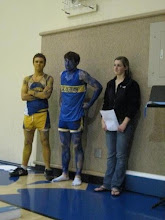Do not go gentle into that good night,Old age should burn and rave at close of day;
Rage, rage against the dying of the light.Though wise men at their end know dark is right,
Because their words had forked no lightning they
Do not go gentle into that good night.Good men, the last wave by, crying how bright
Their frail deeds might have danced in a green bay,
Rage, rage against the dying of the light.Wild men who caught and sang the sun in flight,
And learn, too late, they grieved it on its way,
Do not go gentle into that good night.Grave men, near death, who see with blinding sight
Blind eyes could blaze like meteors and be gay,
Rage, rage against the dying of the light.And you, my father, there on the sad height,
Curse, bless me now with your fierce tears, I pray.
Do not go gentle into that good night.
Rage, rage against the dying of the light.
The Villanelle form is uses not only repetition to drill certain lines into your cerebellum, but also uses a constant rhyme scheme, in which the first and last lines of each tercet always rhyme. This rhyme scheme represents the beginning, the unimportant middle, and the grand finale, which is where the bedridden father lays. The poem represents a child who kneels at his fathers bedside, unable to let go even though his dad has lived a good life. He descends from the wise men, to the good men, to the wild men, to the grave men, and eventually to his father, so perhaps his father did not lead such a spectacular life after all. He describes how each type of man goes into the night, yet they always say either "do not go gentle into that good night" or "Rage rage against the dying of the light" the fact that both of these lines are used in his fathers paragraph is a good indication that his father did not survive his illness.

No comments:
Post a Comment